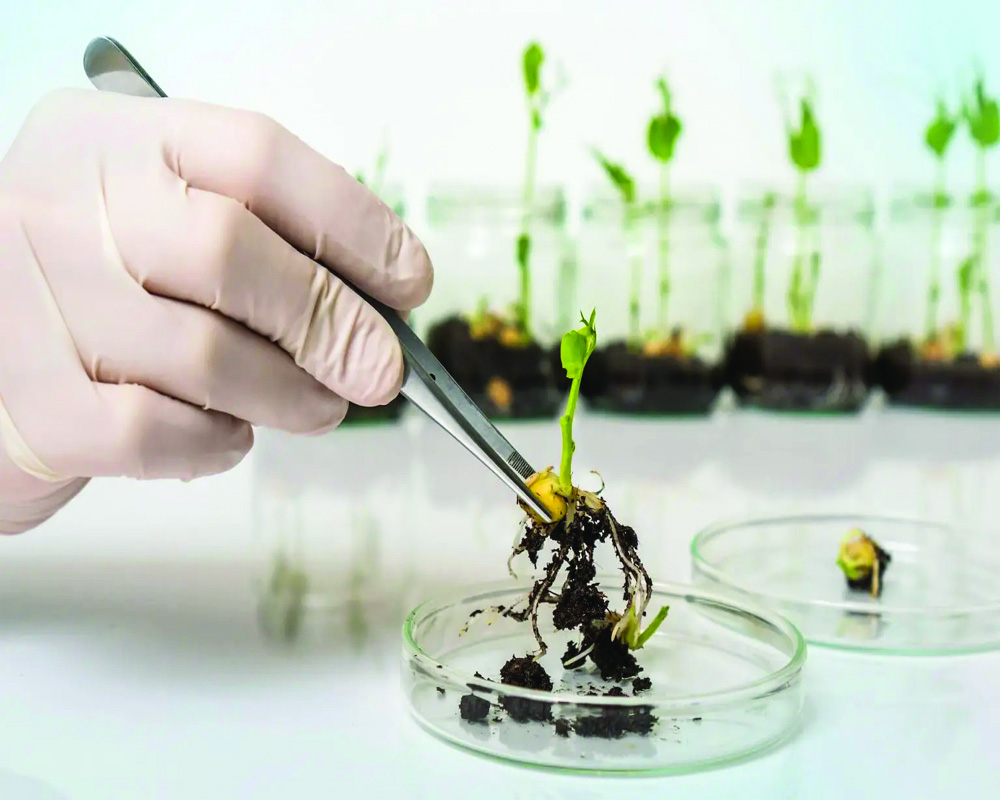
Niti Aayog's recommendations on GM Imports Should be Dumped
We should understand that, once import of GM is allowed in the country, it will pave the path for bringing GMO in agriculture. We need to be cautious of any such efforts. — Dr. Ashwani Mahajan
A few days ago, in a working paper NITI Aayog has recommended, to the Indian government that the import of genetically modified (GM) agricultural products should be allowed in the currently proposed India-US trade agreement. In this, NITI Aayog has also specifically mentioned crops like maize and soybean. It has also been suggested in the working paper that the government should also offer opening of the import of those agricultural products also, which are either not produced in India or their production is so low that their import will not have any significant impact on the farmers. In this regard, the working paper gives the examples of rice, black pepper, soybean oil, shrimp, tea, coffee, dairy products, poultry, apple, almond, pistachio etc., whose import has been recommended to be opened.
After the recommendations by NITI Aayog in this working paper, there have been strong reactions from the farmer organizations including the Bharatiya Kisan Sangh (BKS) and in this regard, NITI Aayog has been vehemently criticized and it has been said that these suggestions are against the interests of the country in general and farmers in particular. For example, the BKS has said that these suggestions are against the interests of the country and the farmers. The BKS also says that NITI Aayog has kneeled before US, which is not a happy sign.
But on the other hand, there is also news that the trade talks between India and America have come to a halt, because the government is not ready to concede the US demand for opening markets for USA’s GM and other agricultural products. In such a situation, this working paper of NITI Aayog is not able to acknowledge the position of the government. This may also be interpreted that Niti Ayog is trying to impact the anti-GM position of the government. Both these situations are not good for the country.
Previously Also NITI Aayog had Supported GM
This is not the first time that NITI Aayog has advocated GM crops. Earlier also, Aayog, under the vice-chairmanship of Prof Arvind Panagariya, also had released a report in favour of GM crops. At that time too, there was strong opposition to the same.
Why is NITI Aayog's advocacy of GM not right?
There has been opposition to GM crops in the country for a long time. Proponents of GM have constantly been making efforts in favour of GM. But due to strong opposition to GM and its solid arguments, GM supporters could not succeed. There are many reasons for their opposition:
The first reason is that most GM crops are herbicide tolerant. That is, when these crops are grown, all the surrounding herbs can be destroyed by using designated herbicides and GM crops are not affected. The International Agency for Research on Cancer (IARC) has classified glyphosate as "probably carcinogenic to humans". https://www.iarc.who.int/featured-news/media-centre-iarc-news-glyphosate/ It is worth noting that when these herbicides are used during the production of GM crops, some of its residues definitely remain in those agricultural products and soil, which can cause cancer. Statistics show that in USA, there are 350 cancer patients per lakh of population, whereas in India this figure is 100 per lakh. https://www.wcrf.org/preventing-cancer/cancer-statistics/global-cancer-data-by-country/ One reason for this is also the excessive use of herbicides used in GM crops in USA.
Although the use and import of GM food products is prohibited in India, but due to the shortage of edible oils, the import of edible oils from US and other countries is increasing for some time, out of which some amount of GM edible oils is also being imported unknowingly. The Government of India has also accepted this earlier. Due to this, the incidence of cancer in India is continuously increasing. Where there were only 8 lakh cancer patients in 2000, by the year 2024 their number has reached 15 lakh. Consumption of GM edible oils could also be one of the reason for the same.
The second reason for the opposition to the import of GM crops is that production and import of GM crops is not legally allowed in the country, as per the law of the land. In international trade, no dispute can be raised by other partner countries in this regard, while respecting our rules. Under the WTO rules, every country has the right to ban goods coming from other countries in view of its right to protect health of its citizens.
As per international rules, it is possible to stop GM products coming from US from entering the country. Since Indian farmers are already suffering financial losses due lack of remunerative prices for their produce, if cheap GM products are allowed to be imported, our farmers will suffer, and in such a situation, if farmers stop practicing agriculture, the food security of the country itself may be in danger.
Thirdly, the sale of GM products is not possible under the food safety rules framed by the Food Security and Standards Authority of India (FSSAI), which mandates that food products cannot have more than a threshold limit of GM ingredients. In such a situation, after allowing import of GM products into the country, they will become part of the food chain in India, which will not only circumvent the rules of the country, but will also pose a threat to the health of the citizens.
Apart from the above reasons, a fourth reason, which goes against the import of GM products in the country, is that the GM products whose import has been recommended by the NITI Aayog are generally not actually consumed by humans in the US. In the US, corn and soya are mostly used either as animal feed or for making ethanol. It is worth noting that in the US, 40 to 50 percent of GM corn is used as animal feed, 30 to 40 percent is used in making ethanol and only 10 percent is used in food processing. Similarly, soya is also mostly used as animal feed. The inclusion of such GM products in the food chain of India is not only harmful for the health of the countrymen but it is also an insult to people of this country.
Although GM products are constantly advocated by the people sitting in NITI Aayog, but due to the opposition by the farmers and enlightened scientists in the country and due to the lack of judicial permission in this regard, they are not able to succeed. In such a situation, when the trade agreement with America is under negotiations, and ban on GM food in India can be used as a shield to protect the interests of farmers and dairy, such recommendations by NITI Aayog are indicative of their indifference towards farmers, and the health of the people and the food security of the country.
Moreover, we need to realise that India exports nearly 50 billion USD worth of agricultural food products, and major attraction of Indian food is that they carry non-GM tag. Moment, GM enters into our food chain, we may lose a major chunk of our export markets, as Middle East countries and European and many other countries, do not allow import of GM food products. Perhaps, NITI Aayog fails to factor in this important risk associated with GM imports and production in India.
The Government of India should ignore these recommendations of NITI Aayog and should rather use ban on GM food as an argument in international trade agreements and as a shield in the trade war, while protecting the farmers, dairy, food security and public health of the country. It seems that despite the opposition of most of the farmer organizations of the country, GM supporters want to allow import of GM in the country at any cost. We should understand that, once import of GM is allowed in the country, it will pave the path for bringing GMO in agriculture. We need to be cautious of any such efforts.


